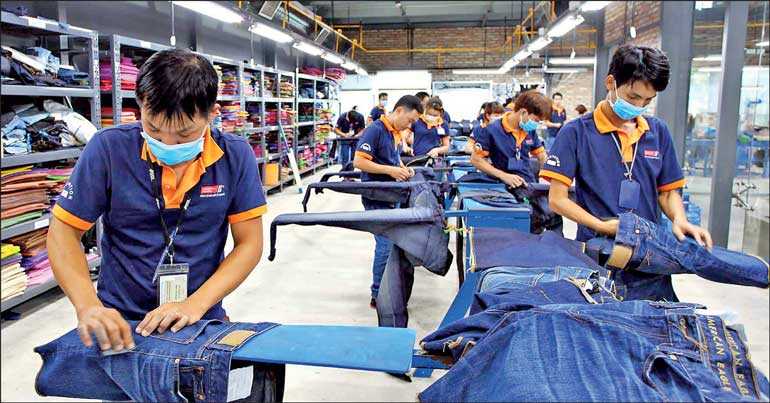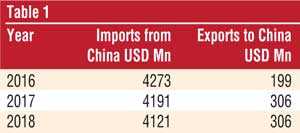Thursday Feb 26, 2026
Thursday Feb 26, 2026
Friday, 6 March 2020 00:00 - - {{hitsCtrl.values.hits}}

The coronavirus epidemic, now named COVID-19 with its epicentre in China’s Hubei Province, has spread to several countries. The increasing number of people who are infected and who have also succumbed to the disease has caused worldwide concern. The health issues impacting humans have been further compounded by disruptions caused to international value chains related to trade with China.
Historically, China has been an important trade partner of Sri Lanka, as well as a friendly country with close links in several other spheres related to culture, investment, security and tourism, among others.
The trade statistics between the two countries clearly show that the trade balance has heavily favoured China. The overall trade statistics for the last three years given in table 1 exemplifies this fact.
The main imported items are electrical machinery and equipment including parts, machinery and mechanical appliances, articles of apparel, mainly fabrics, and transport equipment including floating structures, among others. Sri Lanka’s exports to China are mainly apparel, tea in bulk, rubber and rubber products and coconut coir fibre-based products.
In the prevailing trade structure Sri Lankan traders, especially exporters, import their raw materials, components and intermediate goods from China for incorporation in their finished products. Although the general perception is that Chinese goods are of relatively low quality, their attractiveness for incorporation as inputs in final products is due to their relatively low cost, arising out of economies of scales of production in China. It is also noteworthy that China is the source of machinery and equipment used in production processes.
In recent times China has also emerged as the largest source of commercial loans secured by Sri Lanka in spite of the negative perceptions among many related to relatively high interest costs. Sri Lanka has also been the recipient of substantial grants from China. Grant assistance offered to Sri Lanka in the recent past includes $ 295 million as a partner in China’s Belt and Road initiative, Rs. 2,600 million to boost Sri Lankan defense initiatives to fight terrorism and a China-funded hospital to treat Chronic Kidney Disease of unknown etiology (CKDu), in the North Central Province.
China has also been a source of commercial investments for Sri Lanka, albeit mostly for infrastructure projects, some of which are in the form of joint ventures. Noteworthy among the large investments are the Norochcholai Coal Power Project, the $ 1.4 billion Colombo Port City Project and the Hambantota Port Development Joint Venture, which is expected to stimulate a large number of Chinese Industrial Investments as well as around the Port, the Colombo International Container Terminal (CICT), the Mattala International Airport and a part of the Central Express Highway Project among others.
Tourism
In recent times, China has also become a primary source of tourism for the country. This is due to the increasing number of Chinese citizens who travel out of the country to tourist destinations in the world, as a result of the increasing affluence of the Chinese arising out of the country’s economic advancement as an Asian economic powerhouse.
During the last three years, tourist arrivals from China have numbered 268,952 in 2017, 265,965 in 2018 and 167,863 in 2019. The drop in arrivals in 2019 has been due to the aftermath of the Easter Sunday terrorist attacks. 
In this context, the middle income population of China is known to be growing rapidly and offers a good source for trading, and in particular as consumers of various products and services.
An unfortunate situation has arisen in China due to COVID-19, eliciting sympathy and assistance from many parts of the world. As a close friend of China, Sri Lanka has been particularly responsive in this respect through the conduct of many religious events and prayers in Buddhist temples, Christian churches, Hindu kovils and Muslim mosques, organised mainly through the Sri Lanka China Friendship Associations demonstrating the collective empathy and solidarity of the Sri Lankan people.
Since Sri Lanka is an importer of raw materials, components and intermediate goods from China as inputs for many production processes of manufacturers for export, the disruption that has been caused to the production processes of such enterprises as a result of COVID-19, could be used as a learning experience, and for the development of other suppliers.
However, cost will be an issue when sourcing inputs from other sources. Nevertheless, since Sri Lankan exporters are generally known to conform to certain standards and for relatively high-quality products, efforts can be made to supply such products to niche markets. However, this learning experience should motivate Sri Lankan exporters to reduce their costs of production through improvement in productivity, to be more competitive in international markets.
A related opportunity that is bound to arise is in regard to the supply of inputs to regional value chains. This is due to the fact that the operations of most regional value chains are found to be disrupted due to the inability to source supplies from China, which has hitherto been the case. Herein lies the opportunity for capable Sri Lankan suppliers to fill the voids, through cost competitive inputs of relatively better quality.
The chamber has already embarked on a survey among its member exporters to obtain details of inputs they source from Chinese suppliers, and their ability to supply raw materials, components and intermediate goods, to meet the requirements of regional value chains. The information that is being collected will be collated by the chamber, for communication to the relevant chambers of trade and commerce in countries where opportunities are likely to exist. Such trade chambers will be requested to disseminate information among their members with a view to link suppliers from Sri Lanka.
At the same time, the NCE is mindful of conveying to its member enterprises that these opportunities could be of a short-term duration, until the crisis related to the coronavirus comes to an end, when it is likely that importers in the value chains may shift to their original suppliers from China, due to cost advantages or for other reasons. As such, Sri Lankan suppliers should endeavour to convert their short-term opportunities into long-term sustainability of business relationships by consolidating on short-term gains.
It is now known that many Japanese and US Investments located in China are shifting their factories to countries such as Vietnam due to the adverse impact of COVID-19. This is an opportunity for the BOI to promote the facilities in Free Trade Zones and other positive attributes of the country to attract such production facilities to Sri Lanka.
For instance, the highly literate and trainable workforce available in Sri Lanka, along with the relative cost advantages, may be highlighted in a promotional campaign of the BOI. Attraction of such ventures will also provide an opportunity to employ unemployed graduates for their operations by providing the necessary training to acquire the required skills.